|
Books Should Be Free Loyal Books Free Public Domain Audiobooks & eBook Downloads |
|
|
Books Should Be Free Loyal Books Free Public Domain Audiobooks & eBook Downloads |
|
Science |
|---|
|
Book type:
Sort by:
View by:
|
By: George Chetwynd Griffith (1857-1906) | |
|---|---|
 The World Peril of 1910
The World Peril of 1910
| |
By: George E. Waring | |
|---|---|
 The Squirrels and other animals Illustrations of the habits and instincts of many of the smaller British quadrupeds
The Squirrels and other animals Illustrations of the habits and instincts of many of the smaller British quadrupeds
| |
By: George Edmund Haynes (1880-1960) | |
|---|---|
 The Negro at Work in New York City A Study in Economic Progress
The Negro at Work in New York City A Study in Economic Progress
| |
By: George Ellery Hale (1868-1938) | |
|---|---|
 The New Heavens
The New Heavens
| |
By: George Francis Atkinson (1854-1918) | |
|---|---|
 Studies of American Fungi. Mushrooms, Edible, Poisonous, etc.
Studies of American Fungi. Mushrooms, Edible, Poisonous, etc.
| |
By: George Frank Butler (1857-1921) | |
|---|---|
 Every Girl's Book
Every Girl's Book
| |
By: George Frederick Kunz (1856-1932) | |
|---|---|
 Curious Lore of Precious Stones
Curious Lore of Precious Stones
Full title is "The Curious Lore of Precious Stones, being a description of their sentiments and folklore, superstitions, symbolism, mysticism, use in medicine, protection, prevention, religion, and divination, crystal gazing, birthstones, lucky stones, and talismans, astral, zodiacal, and planetary." Just about everything you ever wanted to know about precious stones, aside from their formation, acquisition, and chemical composition. - Summary by TriciaG | |
By: George Griffith (1857-1906) | |
|---|---|
 Honeymoon in Space
Honeymoon in Space
| |
By: George H. (George Henry) Napheys (1842-1876) | |
|---|---|
 The Physical Life of Woman: Advice to the Maiden, Wife and Mother
The Physical Life of Woman: Advice to the Maiden, Wife and Mother
| |
By: George H. (George Herbert) Carpenter (1865-1939) | |
|---|---|
 The Life-Story of Insects
The Life-Story of Insects
| |
By: George H. Smith (1922-1996) | |
|---|---|
 Benefactor
Benefactor
| |
By: George Henry Makins (1853-) | |
|---|---|
 Surgical Experiences in South Africa, 1899-1900 Being Mainly a Clinical Study of the Nature and Effects of Injuries Produced by Bullets of Small Calibre
Surgical Experiences in South Africa, 1899-1900 Being Mainly a Clinical Study of the Nature and Effects of Injuries Produced by Bullets of Small Calibre
| |
By: George Henry Tilton (1845-) | |
|---|---|
 The Fern Lover's Companion A Guide for the Northeastern States and Canada
The Fern Lover's Companion A Guide for the Northeastern States and Canada
| |
By: George Henry Weiss (1898-1946) | |
|---|---|
 The Seed of the Toc-Toc Birds
The Seed of the Toc-Toc Birds
| |
 The Heads of Apex
The Heads of Apex
| |
By: George Iles (1852-1942) | |
|---|---|
 Little Masterpieces of Science - The Skies and The Earth
Little Masterpieces of Science - The Skies and The Earth
The Skies and the Earth is another in the series Little Masterpieces of Science edited by George Iles and published in 1902. It includes essays on the Sun, Astronomy, Geological Change on Earth, Rivers, the Sea and Earthquakes and Volcanoes by eminent scientists of the 19th Century. - Summary by J. M. Smallheer | |
 Little Masterpieces of Science - Mind
Little Masterpieces of Science - Mind
Another in the series "Little Masterpieces of Science" edited by George Iles, Mind is a collection of articles and book chapters that provide insight into the study of the workings of the mind the nineteenth century. - Summary by J.M. Smallheer | |
By: George John Romanes (1848-1894) | |
|---|---|
 Darwin, and After Darwin An Exposition of the Darwinian
Darwin, and After Darwin An Exposition of the Darwinian
| |
 The Scientific Evidences of Organic Evolution
The Scientific Evidences of Organic Evolution
| |
By: George M. Schweig | |
|---|---|
 The Electric Bath
The Electric Bath
| |
By: George M. Sternberg (1838-1915) | |
|---|---|
 Infection and Immunity
Infection and Immunity
Infection and Immunity with Special Reference to the Prevention of Infectious Diseases presents a subject that is as relevant today as it was in 1903. This book was written for readers without a medical background, and includes general information on infectious disease, as well as specific diseases prevalent at the time. To quote the author, who served as the U.S. Army Surgeon General from 1893-1902, "The general statement may be made that all infectious disease are preventable disease, and at the present time it is possible to indicate the necessary measures of prevention for nearly all of these diseases... | |
By: George McCready Price | |
|---|---|
 Q. E. D., or New Light on the Doctrine of Creation
Q. E. D., or New Light on the Doctrine of Creation
| |
By: George O. Smith (1911-1981) | |
|---|---|
 The Fourth "R"
The Fourth "R"
| |
 The Big Fix
The Big Fix
| |
 History Repeats
History Repeats
| |
 Instinct
Instinct
| |
 Stop Look and Dig
Stop Look and Dig
| |
By: George Russell Shaw (1848-1937) | |
|---|---|
 The Genus Pinus
The Genus Pinus
| |
By: George Sutherland (1855-1905) | |
|---|---|
 Twentieth Century Inventions: A Forecast
Twentieth Century Inventions: A Forecast
This work from 1901 predicts what technological developments will manifest in the twentieth century. The author, a technical journalist, presents ideas for inventions and new developments in the areas of power, transportation, agriculture, mining, domestic applications, electronic devices, warfare, music, art, and news. Many have come to pass. All of them provide an interesting look into how the next century was imagined and what challenges were anticipated for the progress of society. - | |
By: George Vasey (1822-1893) | |
|---|---|
 Delineations of the Ox Tribe The Natural History of Bulls, Bisons, and Buffaloes. Exhibiting all the Known Species and the More Remarkable Varieties of the Genus Bos.
Delineations of the Ox Tribe The Natural History of Bulls, Bisons, and Buffaloes. Exhibiting all the Known Species and the More Remarkable Varieties of the Genus Bos.
| |
By: George Vivian Poore (1843-1904) | |
|---|---|
 London (Ancient And Modern) From The Sanitary And Medical Point Of View
London (Ancient And Modern) From The Sanitary And Medical Point Of View
This little book is an expansion of two addresses delivered in January, 1889. One deals with sanitary issues in London. The other deals with medical issues, mainly through the lives and careers of physicians. Though ancients are included, the main emphasis is upon the sixteenth through nineteenth centuries. - Summary by Book Preface and David Wales | |
By: George W. (Washington) Crile (1864-1943) | |
|---|---|
 Origin and Nature of Emotions
Origin and Nature of Emotions
| |
By: George Wharton James (1858-1923) | |
|---|---|
 What the White Race May Learn from the Indian
What the White Race May Learn from the Indian
People learn from other people, and races have forever learned from other races. Herein we are treated to an in-depth understanding of categorized social characteristics of the Native American peoples, primarily those of the western U.S. as they existed at the time of book publication . 'In dealing with [the Native Americans] as a race, a people, therefore, I do as I would with my own race, I take what to me seem to be racial characteristics, or in other words, the things that are manifested in the lives of the best men and women, and which seem to represent their habitual aims, ambitions, and desires.' - Summary by Roger Melin & book foreword | |
By: Georgeanna M. Gardenier | |
|---|---|
 Two Decades A History of the First Twenty Years' Work of the Woman's Christian Temperance Union of the State of New York
Two Decades A History of the First Twenty Years' Work of the Woman's Christian Temperance Union of the State of New York
| |
By: Georges Victor Legros (1862-) | |
|---|---|
 Fabre, Poet of Science
Fabre, Poet of Science
| |
By: Gerald Vance (1916-2013) | |
|---|---|
 Equation of Doom
Equation of Doom
A world weary space pilot on the lam from earth for crimes unspecified; the most beautiful (earthly) tri-D woman in the universe who is determined to be the most powerful too; a planet of crafty and unscrupulous giant frogs intent on kicking out all aliens; and finally beings who live outside of time. Mix them all together and some very interesting things happen. Very interesting. And disastrous. But there's more! Why did 3000 worlds across the galaxy suddenly blossom almost simultaneously with very similar life and intelligence? Could there have been a common ancestor? Well, give or take a million years, simultaneously... | |
 Vital Ingredient
Vital Ingredient
| |
 3 Science Fiction Stories by Gerald Vance
3 Science Fiction Stories by Gerald Vance
Three Science Fiction stories by the great Gerald Vance: Monsoons of Death is a very nice blend of horror story and a study of true bravery on the planet Mars. A newly commissioned lieutenant finds out a lot about both! In Larson's Luck, Vance takes us on a light hearted jaun into hot shot space ship pilots, piracy and the good part of breaking the rules. The last story, Vital Ingredient, takes the listener far into the future when the sport of boxing still has two musceled opponents battling it out in a ring, but they are simply puppets, every muscle, feint and jab controlled by ring side 'managers'; ex fighters who have moved up... | |
By: Gerald W. Page (1939-) | |
|---|---|
 The Happy Man
The Happy Man
| |
By: Gerard W. Bancks | |
|---|---|
 The Production of Vinegar from Honey
The Production of Vinegar from Honey
| |
By: Gerry Maddren | |
|---|---|
 The Alternate Plan
The Alternate Plan
| |
By: Gertrude Chandler Warner (1890-1979) | |
|---|---|
 Star Stories for Little Folks
Star Stories for Little Folks
Gertrude Chandler Warner, known mainly for her "Boxcar Children" series of mystery books, published this small book of Astronomy, Constellations, and the stories behind them in 1918. It follows the story of a little girl named Helen, and her friend Dr. Lorry as she learns about stars through stories, games, and more. | |
By: Gilbert White (1720-1793) | |
|---|---|
 The Natural History of Selborne
The Natural History of Selborne
The Reverend Gilbert White was the curate of the village of Selborne, a village in Hampshire, from 1784 to his death in 1793, living most of his life in the village. The book is in the form of a collection of letters to two friends, discussing the natural history of the areas that he knew, and natural history in general. White’s intense curiosity and his love for the world about him flow through his simple, straightforward style, and a gentle sense of humour colours many of his anecdotes. | |
 The Natural History of Selborne, Vol. 1
The Natural History of Selborne, Vol. 1
| |
 The Natural History of Selborne, Vol. 2
The Natural History of Selborne, Vol. 2
| |
By: Gina Lombroso (1872-1944) | |
|---|---|
 Criminal Man According to the Classification of Cesare Lombroso
Criminal Man According to the Classification of Cesare Lombroso
| |
By: Girl Scouts of the United States of America | |
|---|---|
 Scouting For Girls, Official Handbook of the Girl Scouts
Scouting For Girls, Official Handbook of the Girl Scouts
| |
 The Girl Scouts Their History and Practice
The Girl Scouts Their History and Practice
| |
By: Glenn D. Bradley (1884-1930) | |
|---|---|
 The Story of the Pony Express
The Story of the Pony Express
The Story of the Pony Express offers an in depth account behind the need for a mail route to connect the eastern U.S. with the rapidly populating west coast following the gold rush of California, the springing up of lumber camps, and all incidental needs arising from the settling of the western frontier. Here we learn of the inception of the Pony Express, its formation, successes, failures, facts, statistics, combined with many anecdotes and names of the people who were an integral part of this incredible entity which lasted but less than two years, yet was instrumental in the successful settlement of two thirds of the land mass comprising the expanding country... | |
By: Gordon R. Dickson (1923-2001) | |
|---|---|
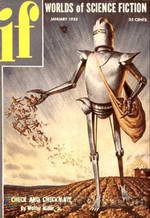 No Shield from the Dead
No Shield from the Dead
| |
By: Gottfried Wilhelm Leibniz (1646-1716) | |
|---|---|
 The Monadology
The Monadology
The Monadology (La Monadologie, 1714) is one of Gottfried Leibniz’s best known works representing his later philosophy. It is a short text which sketches in some 90 paragraphs a metaphysics of simple substances, or monads. What he proposed can be seen as a modification of occasionalism developed by latter-day Cartesians. Leibniz surmised that there are indefinitely many substances individually ‘programmed’ to act in a predetermined way, each program being coordinated with all the others. This is the pre-established harmony which solved the mind body problem at the cost of declaring any interaction between substances a mere appearance, something which Leibniz accepted... | |
By: Grace Coleridge Frankland (1858-1946) | |
|---|---|
 Bacteria in Daily Life
Bacteria in Daily Life
The author provides a fascinating look at the emerging science of bacteriology at the start of the twentieth century including early progress in understanding and preventing diseases such as tuberculosis and diphtheria. The book also includes chapters on the spread of disease through close contact with infected persons as well as from contaminated drinking water and milk. Water purification methods as well as the stability of various disease-causing organisms to extremes of heat and cold is discussed... | |
By: Grant Allen (1848-1899) | |
|---|---|
 The British Barbarians
The British Barbarians
After Civil Servant Philip Christy crosses paths with the mysterious Bertram Ingledew in the respectable suburb of Brackenhurst, Philip and his sister Frida, married to the wealthy Scot Robert Monteith, become friends with the stranger. Bertram has some unconventional concepts about society, and as the story unfolds, his beliefs and actions cause much disruption in the family and the neighbourhood.Who is Bertram? Where does he come from? Allen explores some interesting ideas about society, some of which are curiously relevant today... | |
 Falling in Love With Other Essays on More Exact Branches of Science
Falling in Love With Other Essays on More Exact Branches of Science
| |
By: Graph Waldeyer | |
|---|---|
 The 4-D Doodler
The 4-D Doodler
| |
By: Great Britain. Board of Trade. Railway Dept. | |
|---|---|
 Report of the Railway Department of the Board of Trade on the London, Worcester, and Wolverhampton, and on the Birmingham and Shrewsbury Districts
Report of the Railway Department of the Board of Trade on the London, Worcester, and Wolverhampton, and on the Birmingham and Shrewsbury Districts
| |
By: Green Peyton (1907-1968) | |
|---|---|
 The Chamber of Life
The Chamber of Life
| |
 The Coming of the Ice
The Coming of the Ice
| |
By: Greg Fee | |
|---|---|
 Catalan's Constant [Ramanujan's Formula]
Catalan's Constant [Ramanujan's Formula]
| |
By: Gregor Mendel | |
|---|---|
 Experiments in Plant Hybridisation
Experiments in Plant Hybridisation
Gregor Mendel (1822 - 1884) was an Augustinian monk in the St. Thomas monastery in Brno. His seminal paper "Experiments on Plant Hybridization" presents his results of studying genetic traits in pea plants. It is the ground breaking work on inheritance, being the first to differentiate between dominant and recessive genetic traits. His work was long ignored and deemed controversial, however, at its rediscovery at the turn to the 20th century, it earned Gregor Mendel the title "father of modern genetics". | |
By: Grenville A. J. Cole (1859-1924) | |
|---|---|
 Rocks and Their Origins
Rocks and Their Origins
Do you know the difference between sedimentary, igneous and metamorphic rocks? Are you interested in their geologic origin, chemical composition or how each type affects the landscape? Do you know the differences between limestone, granite and marble as building materials? You will find these and lots of other interesting facts about rocks in this second edition of "Rocks and Their Origins" published in 1922. The author, Grenville A. J. Cole, was an English geologist, Professor of Geology in the Royal College of Science for Ireland and an avid cyclist. | |
By: Guaranty Trust Company of New York | |
|---|---|
 The Fabric of Civilization A Short Survey of the Cotton Industry in the United States
The Fabric of Civilization A Short Survey of the Cotton Industry in the United States
| |
By: Gustave Le Bon (1841-1931) | |
|---|---|
 Psychology of Peoples: Its Influence on Their Evolution
Psychology of Peoples: Its Influence on Their Evolution
"It is barely a century and a half ago that certain philosophers, who, it should be remarked, were very ignorant of the primitive history of man, of the variations of his mental constitution and of the laws of heredity, propounded the idea of the equality of individuals and races... It is in the name of this idea that socialism, which seems destined to enslave before long the majority of Western peoples, pretends to ensure their welfare... The object of this work is to describe the psychological characteristics which constitute the soul of races, and to show how the history of a people and its civilisation are determined by these characteristics... | |
By: H. B. Carleton | |
|---|---|
 Hard Guy
Hard Guy
| |
By: H. Beam Piper (1904-1964) | |
|---|---|
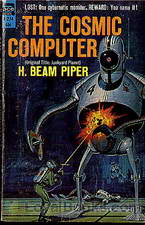 The Cosmic Computer
The Cosmic Computer
Conn Maxwell returns from Terra to his poverty-stricken home planet of Poictesme, “The Junkyard Planet”, with news of the possible location of Merlin, a military super-computer rumored to have been abandoned there after the last war. The inhabitants hope to find Merlin, which they think will be their ticket to wealth and prosperity. But is Merlin real, or just an old rumor? And if they find it will it save them, or tear them apart? | |
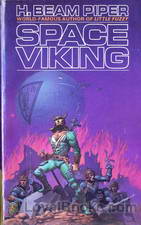 Space Viking
Space Viking
A galactic war has left the Terran Federation in ruins. Formerly civilized planets have decivilized into barbarism. Space Vikings roam the wreckage, plundering and killing for gain. Lord Lucas Trask of Traskon was no admirer of the Space Vikings, but when murder takes his wife on his wedding day, Trask trades everything he has for his own Space Viking ship and sets out on a galaxy-wide quest for revenge. | |
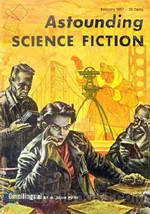 Omnilingual
Omnilingual
An expedition to Mars discovers the remains of an advanced civilization, which died out many thousands of years ago. They recovered books and documents left behind, and are puzzled by their contents. Would the team find their “Rosetta Stone” that would allow them to unlock the Martian language, and learn the secrets of this long-dead race? | |
 The Return
The Return
Two-hundred years after a global nuclear war, two explorers from a research outpost, that largely survived the cataclysm, discover a settlement of humans who have managed to maintain their civilisation despite ferocious cannibal neighbours, the Scowrers. However, the explorers must turn detective in order to understand the mystery of their hosts philosophy and religion. (Description by Reynard) | |
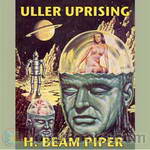 Uller Uprising
Uller Uprising
Uller Uprising is the story of a confrontation between a human overlord and alien servants, with an ironic twist at the end. Like most of Piper’s best work, Uller Uprising is modeled after an actual event in human history; in this case the Sepoy Mutiny (a Bengal uprising in British-held India brought about when rumors were spread to native soldiers that cartridges being issued by the British were coated with animal fat. The rebellion quickly spread throughout India and led to the massacre of the British Colony at Cawnpore.). Piper’s novel is not a mere retelling of the Indian Mutiny, but rather an analysis of an historical event applied to a similar situation in the far future. | |
 Four-Day Planet
Four-Day Planet
Fenris isn't a hell planet, but it's nobody's bargain. With 2,000-hour days and an 8,000-hour year, it alternates blazing heat with killing cold. A planet like that tends to breed a special kind of person: tough enough to stay alive and smart enough to make the best of it. When that kind of person discovers he's being cheated of wealth he's risked his life for, that kind of planet is ripe for revolution. (Introduction from the Gutenberg text) | |
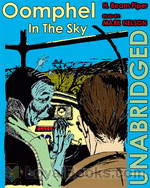 Oomphel in the Sky
Oomphel in the Sky
Natives of the distant planet of Kwannon believe that their world is about to end, and in preparing for the apocalypse, may be unnecessarily bringing about their own demise. The planetary government can’t overcome its own bureaucracy to help them, and the military is overwhelmed. Can a single newsman change the course of a whole people, and save their world? | |
 The Edge of the Knife
The Edge of the Knife
The Terro-Human Future History is Piper’s detailed account of the next 6000 years of human history. 1942, the year the first fission reactor was constructed, is defined as the year 1 A.E. (Atomic Era). In 1973, a nuclear war devastates the planet, eventually laying the groundwork for the emergence of a Terran Federation, once humanity goes into space and develops antigravity technology.The story “The Edge of the Knife” (collected in Empire) occurs slightly before the war, and involves a man who sees flashes of the future. It links many key elements of Piper’s series. | |
 Little Fuzzy
Little Fuzzy
Jack Holloway, a prospector on the planet Zarathustra discovers small furry creatures. These creatures are obviously intelligent, but are they animals or are they sapient? If they are sapient the planet will be declared a protected zone and the company that is developing the planet commercially will lose their exclusive rights to the resources… | |
 Police Operation
Police Operation
H. Beam Piper (1904–1964) was an American science fiction author. He wrote many short stories and several novels. He is best known for his extensive Terro-Human Future History series of stories and a shorter series of “Paratime” alternate history tales. | |
 Last Enemy
Last Enemy
An undercover Paratimer has disappeared on assignment while in an alternate time line, and it’s up to Verkan Vall of the Paratime Police to save her. To do so, he must infiltrate a universe in which assassination is an honorable profession, and reincarnation a scientific fact. Will Verkan Vall survive in a world of killers and the undead? | |
 A Slave is A Slave
A Slave is A Slave
The Galactic Empire is slowly 'welcoming' into the family of civilized worlds those systems so far off in the backwater of the galaxy that they have been overlooked and ignored for the past 500 years or so. This is purely routine work because every planet offered the chance has eagerly accepted the invitation. Mainly because the enlightened Empire lets the planetary government continue to rule and do whatever it wants...with a few minor restrictions of course; and because the they are shown what happens to planets who decide not to accept the invitation... | |
 Null-ABC
Null-ABC
"There's some reaction these days that holds scientists responsible for war. Take it one step further: What happens if "book-learnin'" is held responsible ...?" | |
 Temple Trouble
Temple Trouble
I'll bet you did not know that our little earth is not limited to the single time line on which we happen to exist. That's right; There are actually thousands, no many millions of parallel times, each existing alongside all the rest, using the same real estate, but following their own path. Some extremely primitive, some very advanced, but all blissfully unaware of the others. Of course this does not affect us at all, unless ... unless one of these time lines discovers the existence of the others and then a way to move easily back and forth from one to the other... | |
 Time Crime
Time Crime
The Paratime Police had a real headache this time! Tracing one man in a population of millions is easy--compared to finding one gang hiding out on one of billions of probability lines! | |
 Time and Time Again
Time and Time Again
| |
 He Walked Around the Horses
He Walked Around the Horses
| |
 Genesis
Genesis
| |
 The Answer
The Answer
| |
 Flight From Tomorrow
Flight From Tomorrow
| |
 Crossroads of Destiny
Crossroads of Destiny
| |
 The Mercenaries
The Mercenaries
| |
 Graveyard of Dreams
Graveyard of Dreams
| |
 Day of the Moron
Day of the Moron
| |
 Naudsonce
Naudsonce
Naudsonce? What does THAT mean? Well, to find out you will need to listen to this story where Piper's unique mind explores what we mean by 'communication' and how it happens. The joint Space Navy-Colonial Office expedition was looking for new planets suitable for colonization; they had been out, now, for four years, which was close to maximum for an exploring expedition. They had entered eleven systems, and made landings on eight planets. Three had been reasonably close to Terra-type but were all disqualified by terrible animals or warlike inhabitants... | |
 The Keeper
The Keeper
| |
 Operation R.S.V.P.
Operation R.S.V.P.
| |
 Ullr Uprising
Ullr Uprising
| |
 Dearest
Dearest
| |
By: H. Beam Piper and John J. McGuire | |
|---|---|
 Lone Star Planet
Lone Star Planet
New Texas: its citizens figure that name about says it all. The Solar League ambassador to the Lone Star Planet has the unenviable task of convincing New Texans that a s’Srauff attack is imminent, and dangerous. Unfortunately it’s common knowledge that the s’Srauff are evolved from canine ancestors—and not a Texan alive is about to be scared of a talking dog! But unless he can get them to act, and fast, there won’t be a Texan alive, scared or otherwise! | |
By: H. Beam Piper and John McGuire (1904-1964) | |
|---|---|
 Hunter Patrol
Hunter Patrol
World War IV has dragged on for 12 years and the whole world is drained and tired of the killing and destruction. One man, a high school chemistry teacher from St. Louis in the USA, is serving his latest forced stint in the UN forces when something strange happens to him. He dies but yet he doesn't. What if you had the power to bring peace to the entire world? What would you do? This story explores a frightening and strange journey into the murky depths of human needs and desires and how they can twist and turn back upon us. | |
By: H. F. (Henry Fauntleroy) Harris (1867-1926) | |
|---|---|
 Health on the Farm A Manual of Rural Sanitation and Hygiene
Health on the Farm A Manual of Rural Sanitation and Hygiene
| |
By: H. G. Wells (1866-1946) | |
|---|---|
 The Island of Dr. Moreau
The Island of Dr. Moreau
One of the first instances of science fiction, Wells’ classic tale published in 1986 examines various controversial philosophical issues active at the time of its publication, most notable being the implications of vivisection and degeneration. Narrated by its everyman protagonist Edward Prendick, the novel follows the events of his stay at a mysterious island, home to ghastly secrets, horrors, and incomprehensible experiences. Furthermore, the novel features innovative themes which have become iconic in the modern science fiction genre, including moral and ethical responsibility, evolution, and man’s interference with the course of nature... | |